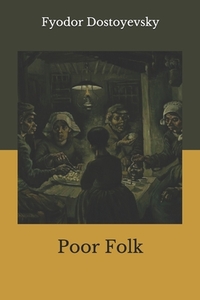Take a photo of a barcode or cover
I really enjoyed this. Yes, it is a sad story. No, I don't think that detracts from it's entertainment value; rather, I think it adds to it's realism. The petty bourgeoisie might pick up a book with a title like this ["Poor Folk"] as a curiosity; only to toss it aside as "drivel", "rubbish", or "an uneventful slog-through." What Dostoevsky is illustrating here won't speak to the experiences of everyone. This is a book about the powerless. It is also a romance, if even a strictly platonic one.
I don't think you will really "get it" if you haven't experienced the anxiety/ anticipation of unrelenting poverty juxtaposed to a deep desire to be worthy of a loved one. Poor folk only really get to enjoy what they're handed to them, everything they expect to earn through hard work and determination is also expected to be taken away by their debtors. Giving to each other only further augments their own personal struggle, and they hide it away with great shame & a façade of meager pride. Love, as perpetually dreaded, being taken away last after everything else "of value" is gone & there is nothing left for you to offer; even your offered company alone not possibly being adequate enough in the face of any one person's baseline metaphysical struggles. Life is at some point a great challenge to everyone; sickness & death beckons all. Then when there no remaining options left to be exhausted, if not by loss of passion, then instead by the irremediable, malignant circumstances of rock bottom misfortune; not just security & luxury, but human connection is finally denied of you as well.
I don't think you will really "get it" if you haven't experienced the anxiety/ anticipation of unrelenting poverty juxtaposed to a deep desire to be worthy of a loved one. Poor folk only really get to enjoy what they're handed to them, everything they expect to earn through hard work and determination is also expected to be taken away by their debtors. Giving to each other only further augments their own personal struggle, and they hide it away with great shame & a façade of meager pride. Love, as perpetually dreaded, being taken away last after everything else "of value" is gone & there is nothing left for you to offer; even your offered company alone not possibly being adequate enough in the face of any one person's baseline metaphysical struggles. Life is at some point a great challenge to everyone; sickness & death beckons all. Then when there no remaining options left to be exhausted, if not by loss of passion, then instead by the irremediable, malignant circumstances of rock bottom misfortune; not just security & luxury, but human connection is finally denied of you as well.
Bu rəy ədəbi cəhətdən zəif ola bilər.
KİTABI BAŞLAYANDAN DEDİM ÖZÜMƏ Kİ BU QIZIN SONDA BİR İŞİ VAR. QORXDUĞUM BAŞIMA GƏLDİ.
A, 500 RUBLE ÜÇÜN ADAMI ÖLÜMƏ TƏRK EDƏRLƏR? YƏNİ, BUNA DƏYƏR? BU ADAM SƏNƏ DEYİB AXI "SƏNSİZ YAŞAMAĞA SƏBƏBİM OLMAZ". İŞLƏTDİYİ CÜMLƏYƏ FİKİR VERMƏK LAZIMDI. DEMİR A "SƏNSİZ YAŞAYA BİLMƏRƏM", DEYİR "SƏBƏBİM OLMAZ". YƏNİ BU ADAM HƏR ŞEYİNİ FƏDA ETMƏYƏ HAZIRDI VƏ MÖVZU SEKS DEYİL, DAHA NƏ İSTƏYİRSƏN, AY QIZ? ADAMI ƏSƏBİLƏŞDİRİR. YOX E, KİTABIN HAMISINI YAZIQ İDİOT OLMUSAN, ELƏ DƏ BİTİR DƏ.
(MƏN DƏ BİLİRƏM, HEKAYƏ DOSTOYEVSKİNİN XƏYAL MƏHSULUDU, AMMA ELƏ MİLYONLARLA QADIN VAR)
BU ADAM SƏNƏ DƏRDİNİ AÇIR, VECİNƏ ALMIRSAN, BU ADAM SƏNƏ SEVİNCLİ BİR XATİRƏSİNİ DANIŞIR, BİR HƏFTƏ SONRA YAZIRSAN. ADAM SƏNƏ DEYİR Kİ ACINDAN ÖLÜR, PALTAR ALMAĞA PULU YOXDU, İLK FÜRSƏTDƏ BORCA PUL İSTƏYİRSƏN.
NƏ OLDU, ƏCƏB OLDU, QOY BIKOV SƏNİ DONUZLARIN YANINDA SAXLASIN.
YOX E, SƏNİN VƏ DEVUŞKİNİN CƏMİ QİYMƏTİ 300 RUBLE ELƏMƏZ, SƏN TƏK ÖZÜNÜ 500 RUBLA SATIRSAN. QƏHBƏLİYİN BELƏSİNİ GÖRMƏMİŞDİM.
KİTABI BAŞLAYANDAN DEDİM ÖZÜMƏ Kİ BU QIZIN SONDA BİR İŞİ VAR. QORXDUĞUM BAŞIMA GƏLDİ.
A, 500 RUBLE ÜÇÜN ADAMI ÖLÜMƏ TƏRK EDƏRLƏR? YƏNİ, BUNA DƏYƏR? BU ADAM SƏNƏ DEYİB AXI "SƏNSİZ YAŞAMAĞA SƏBƏBİM OLMAZ". İŞLƏTDİYİ CÜMLƏYƏ FİKİR VERMƏK LAZIMDI. DEMİR A "SƏNSİZ YAŞAYA BİLMƏRƏM", DEYİR "SƏBƏBİM OLMAZ". YƏNİ BU ADAM HƏR ŞEYİNİ FƏDA ETMƏYƏ HAZIRDI VƏ MÖVZU SEKS DEYİL, DAHA NƏ İSTƏYİRSƏN, AY QIZ? ADAMI ƏSƏBİLƏŞDİRİR. YOX E, KİTABIN HAMISINI YAZIQ İDİOT OLMUSAN, ELƏ DƏ BİTİR DƏ.
(MƏN DƏ BİLİRƏM, HEKAYƏ DOSTOYEVSKİNİN XƏYAL MƏHSULUDU, AMMA ELƏ MİLYONLARLA QADIN VAR)
BU ADAM SƏNƏ DƏRDİNİ AÇIR, VECİNƏ ALMIRSAN, BU ADAM SƏNƏ SEVİNCLİ BİR XATİRƏSİNİ DANIŞIR, BİR HƏFTƏ SONRA YAZIRSAN. ADAM SƏNƏ DEYİR Kİ ACINDAN ÖLÜR, PALTAR ALMAĞA PULU YOXDU, İLK FÜRSƏTDƏ BORCA PUL İSTƏYİRSƏN.
NƏ OLDU, ƏCƏB OLDU, QOY BIKOV SƏNİ DONUZLARIN YANINDA SAXLASIN.
YOX E, SƏNİN VƏ DEVUŞKİNİN CƏMİ QİYMƏTİ 300 RUBLE ELƏMƏZ, SƏN TƏK ÖZÜNÜ 500 RUBLA SATIRSAN. QƏHBƏLİYİN BELƏSİNİ GÖRMƏMİŞDİM.
dark
reflective
sad
slow-paced
Plot or Character Driven:
Character
Strong character development:
Yes
Loveable characters:
No
Diverse cast of characters:
No
Flaws of characters a main focus:
Yes
"You are a genius!" said Belinsky, esteemed Russian critic whose influence can hardly be conveyed by a comparison to today's standards, to a young Dostoevsky his first time completing the novel, followed by a traditional kiss on the left cheek, then the right, and finally the left once more.
This is where it all began. The storied and influential career of my GOAT. It is interesting to see the themes that continue throughout his career to begin to take hold in this shorter work. For example, character wise, we have the character Ratazyaev that has extreme confidence in himself regardless of having no true talent nor intelligence. Similarly, he tears down traditional Russian values, such as those conveyed by Pushkin. (As an aside, I loved the references to other novelists that were successful at the time, such as Gogol and Pushkin, although I needed the references to be explicitly explained to me. 😉 I just ordered a culmination of Pushkin's works translated by P&V and could not be more excited) At this time in young Dostoevsky's life, he was rubbing shoulders with plenty of people like this in his social circles, so his caricature of their beliefs is strong and eventually perfected in his later works, namely Demons but also in those such as Notes from the Underground and Crime and Punishment. Vavara is reminiscent of future characters Nastassia from the Idiot, or Sonya from C&P. Meanwhile, Makar is full of contradictions, wanting privacy but not respecting that of others.
In addition to characters, the themes present in this story are the infantile forms of what will eventually be completely fleshed out by the end of his career. Two main and interconnected themes are the structure of class/the social ladder and faith. Oftentimes throughout the story the lower class is directly challenging the upper. Meanwhile, it is unclear if the upper deserve to be where they are. While the novel begins with ascribing their affluence to God's will, as their ignorance begins to reveal itself the sentiment shifts to it just being dumb luck. Following through with the faith theme, these characters, no matter their position on the societal ladder, can choose to either accept or deny the fact that God is at the top rung. No matter what you achieve on this Earth, you can never aspire to take that position if you have your faith. This is a parallel to later works, such as Crime and Punishment, where the lack of this faith allows certain characters (no spoilers lol) to step across the line of morality. Vavara accepts plenty of suffering throughout this story because she believes that at least He is witnessing it and it is His will, which gives her great comfort. Makar sees Him as the architect and absolves himself to it. These sorts of arguments are fleshed out in 1000+ pages in The Brothers Karamazov.
It took my a while to finish this one, but I am truly glad I did to see where this storied career began.
This is where it all began. The storied and influential career of my GOAT. It is interesting to see the themes that continue throughout his career to begin to take hold in this shorter work. For example, character wise, we have the character Ratazyaev that has extreme confidence in himself regardless of having no true talent nor intelligence. Similarly, he tears down traditional Russian values, such as those conveyed by Pushkin. (As an aside, I loved the references to other novelists that were successful at the time, such as Gogol and Pushkin, although I needed the references to be explicitly explained to me. 😉 I just ordered a culmination of Pushkin's works translated by P&V and could not be more excited) At this time in young Dostoevsky's life, he was rubbing shoulders with plenty of people like this in his social circles, so his caricature of their beliefs is strong and eventually perfected in his later works, namely Demons but also in those such as Notes from the Underground and Crime and Punishment. Vavara is reminiscent of future characters Nastassia from the Idiot, or Sonya from C&P. Meanwhile, Makar is full of contradictions, wanting privacy but not respecting that of others.
In addition to characters, the themes present in this story are the infantile forms of what will eventually be completely fleshed out by the end of his career. Two main and interconnected themes are the structure of class/the social ladder and faith. Oftentimes throughout the story the lower class is directly challenging the upper. Meanwhile, it is unclear if the upper deserve to be where they are. While the novel begins with ascribing their affluence to God's will, as their ignorance begins to reveal itself the sentiment shifts to it just being dumb luck. Following through with the faith theme, these characters, no matter their position on the societal ladder, can choose to either accept or deny the fact that God is at the top rung. No matter what you achieve on this Earth, you can never aspire to take that position if you have your faith. This is a parallel to later works, such as Crime and Punishment, where the lack of this faith allows certain characters (no spoilers lol) to step across the line of morality. Vavara accepts plenty of suffering throughout this story because she believes that at least He is witnessing it and it is His will, which gives her great comfort. Makar sees Him as the architect and absolves himself to it. These sorts of arguments are fleshed out in 1000+ pages in The Brothers Karamazov.
It took my a while to finish this one, but I am truly glad I did to see where this storied career began.
هو العمل الاول لدوستويفسكي , الرواية التي جعلته على الفور اسما مشهورا و رمزا من رموز الأدب الروسي العميق .
هي مجموعة من الرسائل المتداولة من شهر أفريل إلى شهر ديسمبر بين صديقين ' الموظف المسن و الفتاة اليتيمة ' ، يحكي فيها كل منهما عن أخباره و قصصه اليومية , و عن الفقر الذي يعيش فيه و الصعاب التي تواجهه كل يوم لتأمين لقمة العيش و للبقاء على قيد الحياة .
كشفت لنا الرواية عن حقيقة الشعب الروسي , حيث عاد بنا دوستويفسكي الى القرن التاسع عشر و أظهر لنا المعاناة التي عاشتها شريحة فقيرة و مضطهدة في شوارع بيترسبرغ في الوقت أنذاك .
الشيء الذي أحبه بخصوص دوستويفسكي و أعماله هو حبه للتفاصيل , حيث يصف لنا بكل دقة الحياة المريرة التي يعيشها الفقراء المساكين , و الذل و الخجل اللذان تمر بهما النفس البشرية المحتاجة التي لا حول و لا قوة لها لكسب القليل من المال و العيش .
كبداية لعام 2020 , كانت قراءة أكثر من رائعة ❤️ .
هي مجموعة من الرسائل المتداولة من شهر أفريل إلى شهر ديسمبر بين صديقين ' الموظف المسن و الفتاة اليتيمة ' ، يحكي فيها كل منهما عن أخباره و قصصه اليومية , و عن الفقر الذي يعيش فيه و الصعاب التي تواجهه كل يوم لتأمين لقمة العيش و للبقاء على قيد الحياة .
كشفت لنا الرواية عن حقيقة الشعب الروسي , حيث عاد بنا دوستويفسكي الى القرن التاسع عشر و أظهر لنا المعاناة التي عاشتها شريحة فقيرة و مضطهدة في شوارع بيترسبرغ في الوقت أنذاك .
الشيء الذي أحبه بخصوص دوستويفسكي و أعماله هو حبه للتفاصيل , حيث يصف لنا بكل دقة الحياة المريرة التي يعيشها الفقراء المساكين , و الذل و الخجل اللذان تمر بهما النفس البشرية المحتاجة التي لا حول و لا قوة لها لكسب القليل من المال و العيش .
كبداية لعام 2020 , كانت قراءة أكثر من رائعة ❤️ .
Thanks for making me experience nothing but misery for 4 hrs.
I've always been eager to read dostoyevsky's first work... I guess a part of me wanted to see him at his worst ...i wanted to see what an inexperienced Fyodor would sound like...but instead i just ended up respecting him more for sa many reasons, one of them was the fact that he chose to write letters as a first work and that's just brave, i just love the way he was able to represent that much of a misery in only two persons; and the cherry on top was Pushkin i was just glad that i got to see his reader side .
Very emotional! And I loved the structure. Interesting to say the least. Didn't drag as much as it seemed to (if that makes any sense), and was happier than what was written. Altogether, quite enjoyable.
emotional
sad
tense
fast-paced
Plot or Character Driven:
Plot
Strong character development:
No
Loveable characters:
Yes
Diverse cast of characters:
No
Flaws of characters a main focus:
No
In questo romanzo di esordio del giovane Dostoevskij emerge immediatamente il talento che caratterizzerà tutte le sue opere successive: la capacità di trasferire su carta l'animo degli uomini attraverso i suoi personaggi. Il romanzo è scritto sotto forma di uno scambio epistolare tra i due protagonisti, una povera orfana malaticcia e sventurata e un suo lontano cugino, di estrazione umile e forse innamorato di lei (non uso i nomi perché non ho davanti il romanzo e non ricordo come si scrivono); i due vivono in un contesto di povertà e attraverso le loro lettere conosciamo da vicino le drammatiche storie di alcuni loro conoscenti.
Ho trovato i personaggi estremamente realistici nei loro pregi e difetti e soprattutto mi hanno commosso alcuni episodi narrati nelle lettere. Anche il finale mi è piaciuto molto: triste ma allo stesso tempo con una lievissima speranza di miglioramento, almeno materiale.
Ho trovato i personaggi estremamente realistici nei loro pregi e difetti e soprattutto mi hanno commosso alcuni episodi narrati nelle lettere. Anche il finale mi è piaciuto molto: triste ma allo stesso tempo con una lievissima speranza di miglioramento, almeno materiale.






